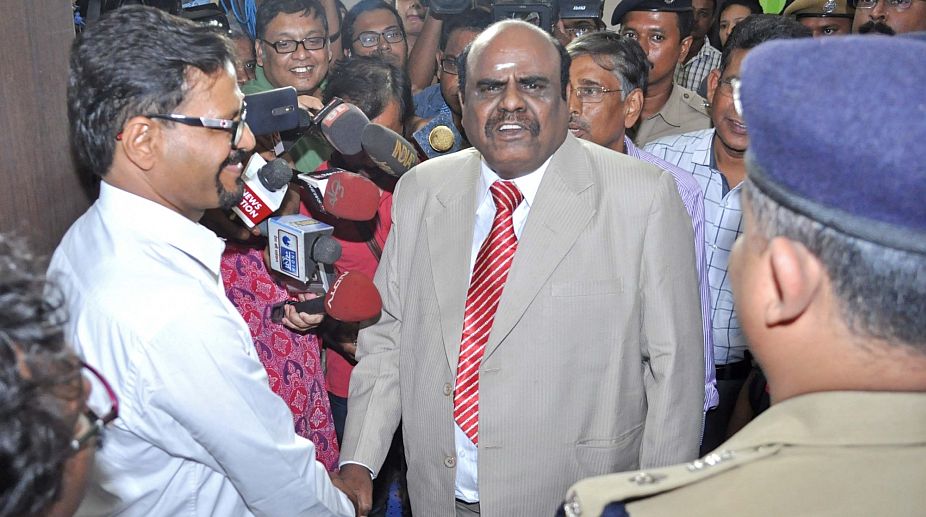President Kovind receives plea for remission of jail term from Karnan
Former Calcutta High Court judge CS Karnan on Tuesday sought remission of the six-month jail term from newly sworn-in President…

Former Calcutta High Court judge CS Karnan (Photo: IANS)
The Supreme Court last Wednesday refused to entertain jailed former Calcutta High Court judge CS Karnan’s plea to grant him interim bail pending the seven-judge Bench’s promised detailed order convicting him of contempt of court and sentencing him to six months’ imprisonment. No charges were framed against him. While holding him guilty of contempt of court, the order does not say what contempt Karnan has committed.
Only after knowing in detail the alleged contempt he is said to have committed, can he file an application seeking recall or review of the order. The Supreme Court has no supervisory or disciplinary jurisdiction over High Courts which are not subordinate to the apex court.
It has only appellate jurisdiction in judicial matters. In an unprecedented move, the Supreme Court directed the Calcutta High Court to deny Karnan any judicial and administrative work. As master of the roster, this is the sole prerogative of the Chief Justice of the Calcutta High Court. A more disturbing aspect is the Supreme Court’s gag order against the media which was uncalled for.
Advertisement
A Vacation Bench of Justices DY Chandrachud and Sanjay Kishan Kaul ruled that there was an order passed by a seven-judge Bench and it was binding on all.
They could not suspend operation of the order or grant him interim bail. The rule on bail has been given a scientific orientation by former Supreme Court Justices VR Krishna Iyer and DA Desai through their 1978 judgment in the Babu Singh and others vs the State of UP case, wherein it was iterated that bail not jail is the rule. The personal liberty of an accused or convict is fundamental as enunciated in Article 21 of the Constitution. No person shall be deprived of his life or personal liberty except according to procedure established by law.
The ruling of Justices DY Chandrachud and Kaul brings back memories of the 1976 ruling of the Supreme Court that “no person has any locus standi to move any writ petition under Article 226 before a High Court for habeas corpus or any other writ or order or direction to challenge the legality of an order of detention.” Justice HR Khanna’s was then the lone dissenting voice. Writing a letter to the Prime Minister leveling corruption charges against a few judges of the Supreme Court and the Madras High Court does not constitute contempt of court.
The Judicial Standards and Accountability Bill which provides for disciplinary action against erring judges is yet to be enacted.
The Chief Justice of India could have sought impeachment of Karnan, the only constitutional course available to remove a Judge.
Instead, the Supreme Court initiated suo motu contempt proceedings against him.
The Judicial Officers’ Protection Act, 1850, read with the Judges’ Protection Act, 1985, says if an act done or ordered to be done by a judicial officer in the discharge of his judicial duties is within the limits of his jurisdiction, he is protected even if he has discharged those duties erroneously, irregularly or even illegally. The immunity afforded to the judges is in public interest.
Therefore, the judiciary has a greater responsibility to ensure that people’s liberty is not trampled upon.
Advertisement